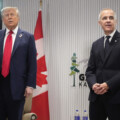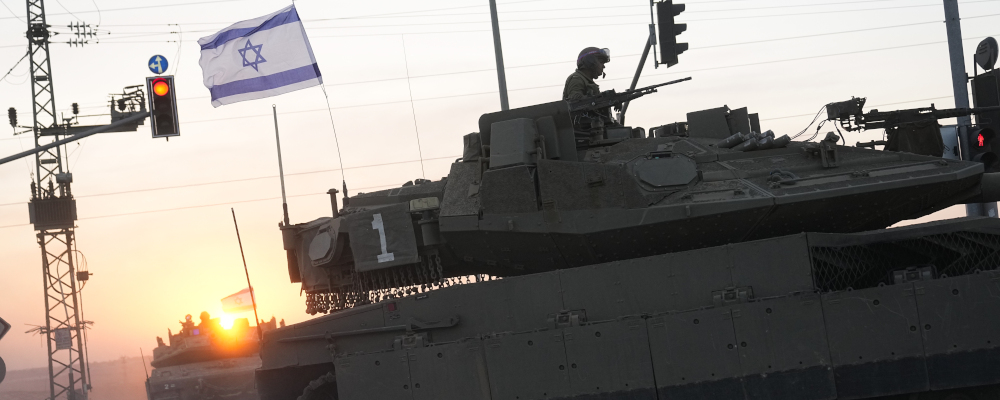When news broke on Saturday morning about the deadly surprise attack carried about by Hamas terrorists against Israeli civilians the world’s attention was entirely focused on the Middle East and, at The Hub, it was no different.
We featured a new essay or podcast about the war in Gaza every day this week and Hub Forum, our new web forum for Hub members, was buzzing all week with discussion about it.
The goal of Hub Forum is to bring the impressive knowledge and experience of The Hub community into one place and with that in mind, here are some of the most interesting comments this week.
Sign up for our daily Hub Forum email newsletter today.
David Frum: ‘Hamas started the war. Let Israel finish it’
Sunday, Oct. 8, 2023
“I suggest that pundits, aside from condemning Hamas and this “aktion” as a further example of why Hamas in most places is viewed as a terrorist organization, bite their tongues for a while to see once the dust settles, what Israeli does and whether Egypt, as it has in the past, brokers a ceasefire to stop the senseless destruction and loss of innocents’ lives on both sides, and to give negotiators an opportunity to get active.”
— Jon Snipper
Janice Gross Stein on the surprise attack on Israel and the best historical analogy to the crisis
Monday, Oct. 9, 2023
“At the moment both sides in this conflict refuse to listen, to dialogue and be present to the needs and suffering of everyone. Ideology once again stands in the way, blinding both sides to peace… It was encouraging to hear a young man say that although is grandmother was killed in yesterday’s fighting, he was open to dialogue so that peace could be found. Maybe the younger generation is the hope for the way forward.”
— A. Chezzi
Shocking pro-Hamas, anti-Israel rallies lay bare the limits of Canadian pluralism
Tuesday, Oct. 10, 2023
“With Canada’s growing diversity, the natural tensions between freedom and acceptance of a values-based consensus will become more challenging. This is where the role of teaching in our schools becomes more seminal than ever.”
— Thomas d’Aquino
“Sean’s point was pluralism requires principles and limits. If we are not careful, we will be become dangerously fragmented as a society. Marches in support of anything that does not cross into hate speech (from a legal perspective) should be permitted. Although unsavory, ugly, or even despicable, it is not much of a cost. Counterprotests, counter speech, and social costs for participating should also be fair game and send an important counter signal. We need to see ourselves peacefully but unambiguously not accepting these abhorrent views. The social media monetization of outrage is making this a much bigger challenge.”
— Rob Tyrrell
“Your article strikes at the heart of the most challenging aspect of Freedom of Expression, as defined in our Charter of Rights and Freedoms. Canadian Gov’t DOES have the ability and duty to limit hate speech. You can’t just do or say anything and be permitted, nay protected, as if this is a ‘right’. It is not. What Canadians often forget is that although we are a melting-pot of cultures, there is a fundament that Canada is built upon; a culture and set of values, and becoming a Canadian means adopting those values while honouring and preserving the culture of one’s heritage.”
— Peter Byrne
“There is no equivalence between a recognition of the rights of the Palestinian people and the slaughter of innocent people by the nihilistic Hamas.”
— Steve J. Chipman
Pro-Hamas demonstrations may be despicable, but they are still legal—And that’s a good thing
Wednesday, Oct. 11, 2023
“Obviously these demonstrators don’t qualify and if they aren’t Canadian citizens, they should not be allowed to become so. Would that a person with the writer’s kind of control and thoughtfulness were in charge of the Israeli response, now clearly eroding with its attacks on civilian centres and closing the Egyptian escape hatch, whatever high moral ground in the court of public opinion Israel had regained after so much has been lost. However, signs saying “Death to Jews” seem to me to qualify as hate speech and those carrying them should be prosecuted and if they are immigrants, deported if the law so permits. Our country should not become a duplicate of the battle grounds in the Middle East.”
— Jon Snipper
“The right to free speech is very important and dare not to be suppressed or canceled just because someone else doesn’t like what you are expressing.”
— Austin Brown
‘Israel is going to endure’: Bret Stephens on anti-Semitism and Israel’s war against Hamas
Thursday, Oct. 12, 2023
“This is a beautiful dialogue, and I agree whole heartedly. I have spent time in Israel as recently as February, with a group of Orthodox Jewish women. There is no question that we are family, sisters , regardless of political leaning. It never hurts to pray to something larger than ourselves.”
— Joan Tucker
“Israeli officials keep saying they know not all Gazans are pro Hamas but they are doing nothing to show that they mean what they say. This whole situation has been covered with generations of layering of misinformation and propaganda. Neither the present Israeli government, nor Hamas will find the solution. What is needed is a wholesale change on both sides.”
— A. Chezzi

Why are normally outspoken universities suddenly hesitant to condemn violence against Israel?
Friday, Oct. 13, 2023
“Universities have a lot of diverse and demanding customers/students to keep happy. Commenting on a heinous event related to a complex, multi-party, eight-decade conflict could be considered “tricky”, especially if sympathies are predominantly with one of the two primary sides. HOWEVER, when it comes to wholesale, carefully planned, and inexcusable atrocity, it is the act alone that must be condemned in absolute terms, free of all context. This includes universities.”
— Rob Tyrrell
“Whether universities commenting on such situations could do so from a position of neutrality is a matter of debate but given how nuanced this particular case is I believe no public comment is the wise choice. Classroom discussions—backed by comprehensive historical research from parties on both sides—would be valuable and perhaps a synopsis of these debates and their conclusions might be a useful addition to the discourse.”
— Gordon Divitt
Recommended for You

Kirk LaPointe: B.C.’s ferry fiasco is a perfectly Canadian controversy

‘I want to make Canada a freer country’: Conservative MP Andrew Lawton talks being a newbie in Parliament, patriotism, and Pierre Poilievre’s strategy

The Notebook by Theo Argitis: Trump halts trade talks, Carney’s trade-offs and John McCallum’s legacy

The Weekly Wrap: The Liberals must abandon their internet regulation agenda



